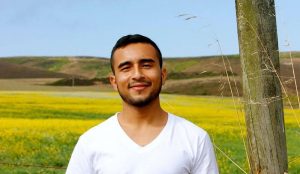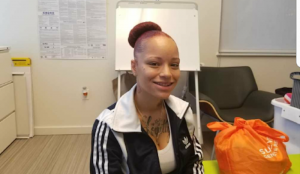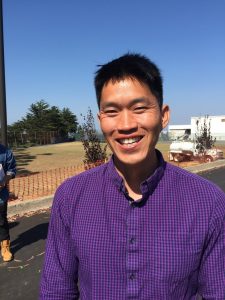KALW News Team Provides Current Napa Fire Updates and Long-Form Storytelling
By Ben Trefny, News Director, KALW News Director
This has been a very difficult and emotional week. Many of us know people who have been dramatically affected by the fires. While this challenged us personally at KALW, I’m really pleased with what we were able to accomplish professionally this week.
In our news department, we went far beyond what we usually do by providing regular info to KALW’s announcers throughout the week so they could keep our audience up-to-the-minute on the unfolding disaster, I gave updates with interviews and news briefs on our local broadcast of All Things Considered Tuesday, Wednesday, and Thursday in addition to our work on Crosscurrents, and we had a reporter in Santa Rosa putting together stories for us in addition to statewide and national programs. A lot of our ability to do all that is thanks to Audio Academy fellows Christine Nguyen, Lilia Vega, and Bo Walsh and their work monitoring the fires, as well as the rest of our news gatherers in the Academy.
Also, we had some really nice examples of our signature long-form storytelling that Audio Academy alums got on the air this week:
Jeremy Jue (’17) reported a personal, touching, wonderfully crafted, brave, and memorable story about Stanford’s Legacy Letters program and ways to communicate with and remember our most loved ones.
Hannah Kingsley-Ma (’15) made a really excellent non-narrated piece about immigrant Javier Zamora and his forceful and insightful poetry.
Claire Stremple (’17) took us on an oddly delightful, cleverly written, and informative history tour of San Francisco, the sexual revolution, the Vietnam War, and the rise, fall, and rise again of gonorrhea.
Wonderful work, all around!
In my last blog post, I called attention to a well-executed radio diary that Jeremy put together with his editor, Lisa Morehouse, about a one-time foster child pregnant with her first baby. That kind of story, where you give the recorder to the subject and ask them to record their life experiences and observations, takes a lot of work, a lot of patience, and a lot of empathy. Those are all qualities that Jeremy has in abundance. I asked him to share some thoughts about his process, and here’s what he had to say:
Last spring after hearing the radio diary Teen Contender, I knew that I wanted to try producing one myself. I respected the format and really liked the idea of getting to know an individual over a period of time. As a listener, I felt that a radio diary could transport me into the shoes of the person sharing their story, and I found that fascinating. I was interested in profiling a young person in foster care and so reached out to First Place For Youth, an organization that helps past and present foster kids. The staff there connected me with Jakeri Bawcum.
Jakeri was 22 and pregnant when I met her. She had spent the first 8 years of her life in and out of the foster care system, and I was interested in how her history influenced the decisions she was making as an expecting mother. Lucky for me, she was willing to share her story and keep an audio diary.
After interviewing her, and sharing some clips from other radio diaries, I gave her a recorder and reviewed R.A.N.T., an acronym to remind her to Reflect, collect Ambi, Narrate, and remember to include Tone and a Timestamp when recording. Then I waited, anxious to hear and assess her first set of recordings. What she came back with was great. She was a natural and seemed comfortable reflecting on her day and sharing her thoughts and feelings.
The next step was creating a schedule and with the help of Jakeri’s Youth Advocate, I was able to I was able to connect and meet with Jakeri every couple of weeks. Each time we met, I would collect Jakeri’s recordings and check in with her. Sometimes we talked about things that I had heard in her recordings, other times we’d focus on her history and how she was doing. It was always nice to talk with her, and I tried to let her know how much I appreciated her honesty and openness. I also made a point to provide feedback, and encouraged her to collect more ambi so that listeners could be with her in the different places that she mentioned in her recordings.
In the end, after over 2 months or working together, Jakeri collected nearly 40 recordings. Using these, along with 4 extensive interviews, I slowly began to put together Jakeri’s radio diary. Deciding what to cut was not easy. What helped was reminding myself that the point of the radio diary was to document this specific point in Jakeri’s life. As a result, I tried to use Jekeri’s recordings to show the progression of her pregnancy and the changes of her physical, emotional, and mental state throughout the process. I pulled from our interviews to provide context and give Jakeri the opportunity to share with listeners some of her history and hopes for the future.



